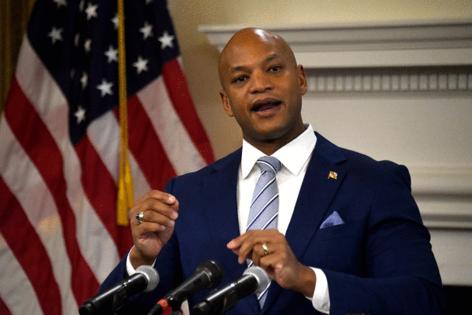Maryland Gov. Wes Moore signs order to help economic growth amid job growth, budget shortfall
Published in News & Features
BALTIMORE — Business leaders praised an executive order signed by Gov. Wes Moore last week in an effort to bump Maryland’s economic growth while state officials face a $3 billion budget shortfall.
Moore signed the order, which establishes multiple initiatives seeking to make the state more friendly to business development, at a Friday ceremony in downtown Frederick, against the backdrop of an ongoing hotel and conference center project. It came alongside a rosy November jobs report from the Bureau of Labor Statistics, with preliminary numbers released on Friday showing that Maryland’s total employment grew by about 7,100 jobs last month.
It also came as Maryland lawmakers prepare for a session in which “everything is on the table” as far as addressing a ballooning budget deficit. A number of the state’s economic growth indicators have lagged since 2017, the state comptroller’s office noted in a report early this year, though the state’s budget has increased significantly since then.
The order establishes the Governor’s Office of Business Advancement, a new agency within the Department of Commerce that Moore’s office said in a news release will provide “concierge, white-glove service to businesses seeking to relocate or expand in Maryland.” It also creates a new council that aims to streamline permitting and environmental review for major projects. A subcabinet under the governor will focus on economic competitiveness and directs state agencies to leverage their resources to support growth in a number of industries, including life sciences, information technology, aerospace and defense, computational biology, and quantum technology.
The Maryland Chamber of Commerce praised Moore’s executive order, with the statewide chamber’s president and CEO, Mary D. Kane, calling it an “an important step forward for Maryland’s businesses, communities, and workforce” in a statement. In a September guest column for The Baltimore Sun, Kane called Maryland’s fall to 31st place in CNBC’s 2024 Top States for Business rankings “a glaring warning sign about our state’s economic competitiveness” that demanded “immediate attention and decisive action.”
Moore said in a statement that with his order and partnership with lawmakers in the Maryland General Assembly’s upcoming legislative session, the state has “an opportunity to change the trajectory of the downward decline that our state’s economy has experienced over the past several years.” He said that Maryland must create the climate necessary for business growth and find impediments to growth “for Maryland to win the decade.”
The order also requires state agencies to review certain business licensing programs, as well as tax credits and other incentive programs, and issue recommendations on their effectiveness. It establishes a “loaned executive” program that aims to “cultivate a culture of innovation and excellence” at the Maryland Department of Commerce by temporarily assigning private sector executives to the state agency.
The November jobs report noted that Maryland’s unemployment rate remained lower than the national average last month despite rising by 0.1%, a minor bump that Maryland labor officials said in a news release was attributed to the state’s labor force growing by an estimated 2,700 new workers. The public sector, as well as professional, scientific, and technical services; the health care and social assistance industry; and retail trade fields grew the most in November, according to the BLS. The administrative and support industry and the waste management and remediation field lost the most jobs.
----------
©2024 The Baltimore Sun. Visit at baltimoresun.com. Distributed by Tribune Content Agency, LLC.







Comments